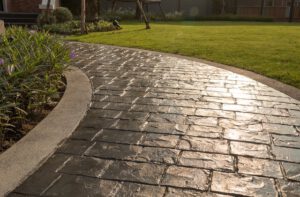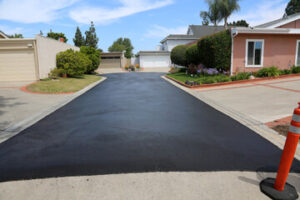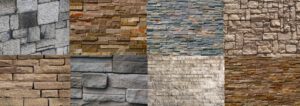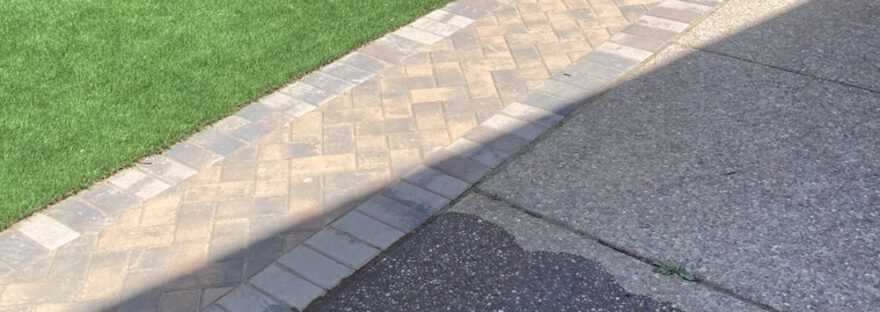Driveways serve both function and style, and a shabby driveway takes away from curb appeal. A professional can repair and resurface your driveway, making it look new again.
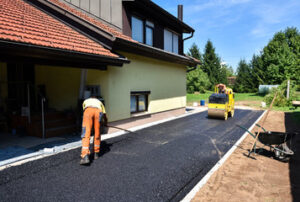
Repairing and resurfacing are more cost-effective options than replacing your driveway. However, if your driveway has large cracks, it may be time to replace it.
Asphalt is a popular choice for residential driveways because of its attractiveness, ease of maintenance, and cost-effectiveness. However, asphalt is not impervious to damage and wear, particularly in our climate. Annual freeze-thaw cycles, rain, and heavy vehicles all take their toll on asphalt surfaces, causing them to degrade over time. Properly cared for, a well-constructed asphalt pavement can last 20 or more years. However, as the surface deteriorates, more extensive repairs or even replacement may become necessary.
An asphalt contractor can spot-repair, resurface, or replace the surface of your driveway to extend its lifespan. Do-it-yourselfers can also repair asphalt by sealing cracks, troweling on patch material, and filling holes with cold patch asphalt. This process takes some effort and time, but the results can make your driveway look brand new again.
A common sign that your asphalt driveway needs repair is hairline cracks, which may be caused by weathering or poor installation. If your cracks are wider than hairline, they probably need a more thorough repair. You can usually fix these with a rubberized asphalt-emulsion crack filler or, for larger gaps, you can use Dalton’s Pli-Stix, which is a rope-like asphalt patch and joint sealer that you melt in place using a torch.
When alligator cracks, potholes, or divots appear, you’ll want to call an asphalt paving professional for more extensive repair or replacement work. Holes and cracks that are deeper than a few inches need to be cleaned and prepared before they can be repaired. A paving contractor will add gravel as a base to support the asphalt, then pour and compact the patch material into the hole or crack.
Extensive asphalt repairs or resurfacing can’t be undertaken during the winter, as the hot asphalt requires warm ambient air and surface temperatures to stay workable and to cool and cure properly. Even so, you can make some minor repairs and surface-seale your driveway during the winter to give it a fresh appearance and slow its deterioration. In the worst cases, though, your driveway may need to be replaced entirely, especially if it’s in such a poor condition that its integrity is compromised by the surrounding soil or subgrade.
Concrete
Concrete driveways can be more expensive to repair than asphalt, but they are generally more durable and provide better structural integrity. Concrete is also fairly easy to keep clean, and regularly scheduled maintenance will extend the life of a concrete driveway. If left untreated, though, the damage will eventually catch up to a point where repairs or replacement are necessary.
When a concrete driveway shows signs of damage, it is important to act quickly to prevent the problem from becoming worse. Small cracks, divots and other problems can easily be repaired with a patching kit. Larger cracks may require the help of a professional contractor. Once the cracks are filled, they should be sealed with a special concrete sealer.
If you notice that your concrete driveway is heaving or has sunken sections, these can be raised back up to level with the rest of the driveway by injecting a lifting foam underneath. A pro can also restore the surface with a concrete overlay.
A resurfacing solution will cover up any discoloration and other cosmetic issues, and can be done in a variety of ways, including stamping or coloring the new concrete. Refinishing and resurfacing are less expensive options for concrete repair than replacing the entire driveway, and they can add a new look to the property.
It is also possible to extend the life of a concrete driveway by waterproofing it. This process helps to prevent water from seeping into the joints and eroding the concrete, as well as keeping the surface cleaner by removing oil and grease stains.
If you have a concrete driveway that is in need of repair, contact a concrete driveway specialist to discuss your options. They will inspect the driveway and recommend the best repair solution for your needs. It is important to make any necessary repairs before the damage worsens, as this will ensure that your driveway lasts longer and is safe for vehicles and pedestrians. It can also increase the resale value of your home. If you are considering selling your home in the future, a well-maintained concrete driveway will attract potential buyers and may help your house sell faster and for a higher price.
Wood
If you have a wood driveway, you’ll need to repair it from time to time. Wood will rot if not protected with paint or stain, and it can be damaged by moisture and other factors like sun exposure. Wood is also very sensitive to temperature changes and will expand and contract with the weather. This can cause problems with door hinges and even split or crack the gate.
Fortunately, there are some effective solutions to these issues. A good wood driveway repair starts with a thorough cleaning, and this can be done using a pressure washer or hand-held brush and broom. After that, you’ll want to treat the surface with a commercial wood preservative. There are a variety of products to choose from, including those made with linseed oil and others that use other natural oils. It’s also a good idea to get a tar-based sealer to protect the wood from moisture and other factors.
As a homeowner, you can repair small potholes in your wood or asphalt driveway by first cleaning out the dirt and debris from the area. Next, apply the cold patch asphalt or wood filler to the hole and pack it firmly. Then, tamp down the patch with your car to compress and bind it to the pavement underneath. Be sure to wear rubber gloves and old clothes when doing this driveway repair, as you will likely end up with a lot of tar on them. Also, be sure to put down a sheet of plywood over the asphalt patch afterward, and don’t drive over it until 30 days have passed and the asphalt is fully cured.
Larger concrete repairs, such as those that include lifting sunken slabs and extensive surface damage, require professional help. These services will cost more, but the quality of their work will ensure that your repairs last for a long time. It’s also a good idea for homeowners to consider resurfacing their entire driveway, or replacing it altogether if the damage is significant and widespread. This is typically a more cost-effective option than repeated repairs or replacements of individual sections.
Stone
In a world that seems to be filled with asphalt and concrete driveways, stone can seem downright quaint. However, stone offers a variety of benefits that asphalt and concrete simply can’t match. It’s also one of the lowest-maintenance options for a driveway. It is important, though, to keep up with the maintenance and repairs to a stone driveway. Otherwise, the stones may become loose and erode the surface.
While there are many types of stone to choose from, some of the most common choices for a driveway are crushed rock and gravel. Crushed rock is often chosen for its durability and ability to withstand heavy traffic. The angular shape of crushed rock helps to hold it in place and resist shifting, making it ideal for use as a driveway material. Another option is a mix of smaller stones and pebbles, which also compact well and provide good drainage in rainy weather. This type of driveway surfacing is typically known as road gravel and can be very affordable.
If you have a stone driveway, you should regularly sweep it or rinse it to remove any mud and dirt that builds up. This will help to prevent the emergence of weeds and to keep the stones from becoming too loose. In addition, it is important to have the area plowed by professionals during snowy months. This will help to prevent the stones from being scattered by the plow and to ensure that they are secure enough to be safe for driving on.
Loose stones can cause a number of problems, including dust, ruts, and bare spots that need to be filled with more material. While some erosion is to be expected, keeping up with the maintenance will prevent it from getting out of control.
When repairing a rut or other damage to your stone driveway, it is important to start with the base layer. For this, you should use a box blade or land plane to smooth out the surface and dig down to the right depth. A general rule of thumb is that if you’re digging up any material the size of your fist, you’ve gone too deep.
